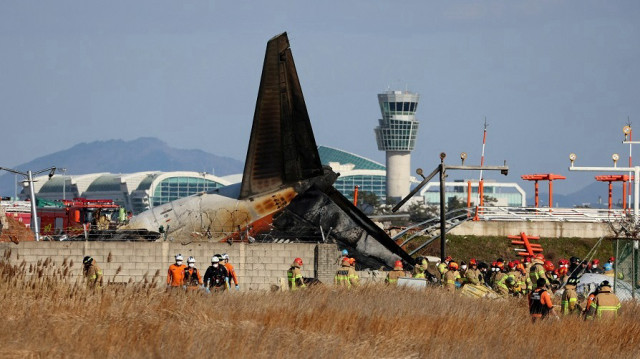
Most victims are from Gwangju metropolitan area and South Jeolla province
- Flight recorder damaged, may take months to decode
- 2nd flight returns to Muan International Airport after reporting same landing gear issue
- Official report had warned of ‘substantial danger of bird strike' at Muan International Airport, located near known habitat of migrating birds
South Korean authorities Monday continued investigations into Sunday's deadly Boeing 737-800 plane crash that killed 179 passengers and crew, focusing on a possible bird strike.
While it may take months to decode the flight data recorder which was damaged in the crash, investigators are focusing on bird strikes at the Muan International Airport, 288 kilometers (179 miles) southwest of the capital Seoul.
The airport is located near a known habitat of migrating birds in the South Jeolla province and the far east nation has declared national mourning, with almost all New Year events cancelled.
Most of the victims, 157 out of 179, were from the Gwangju metropolitan and South Jeolla province, while two were from Thailand, from where the plane had flown to South Korea.
The identities of 141 victims have been established.
A passenger and a crew member were rescued alive from the tail end of the plane which crashed into the wall of the airport early Sunday.
It was the deadliest aviation crash involving a domestic carrier Jeju Air plane in South Korea since 1997, when a Korean Air plane crashed in Guam, killing 225.
The Jeju Air pilot reportedly told the air traffic control that the passenger plane "suffered a bird strike before it crashed."
It was also reported that "only one person was working on bird strike prevention duties" when the accident happened.
South Korean authorities will be joined by a team from the US Federal Aviation Administration, as well as officials from Boeing, to support the current investigation, the Yonhap News reported.
The flight data recorder may be sent to the US for decryption by the National Transportation Safety Board, officials in Seoul said.
While the initial probe pointed to the failure of all three landing gears, according to the daily Korea Herald, a government-commissioned report in 2020 had “warned the government of bird strike issues” for Muan International Airport.
There is “substantial danger of bird strike when an airplane takes off or lands" at the airport, said the report, calling for measures to reduce such risks.
On Monday, a second Jeju Air flight returned to the airport after departure “due to the same landing gear issue,” while all are safe.
Authorities have also ordered the inspection of all Boeing 737-800 planes used by airliners in the country.

